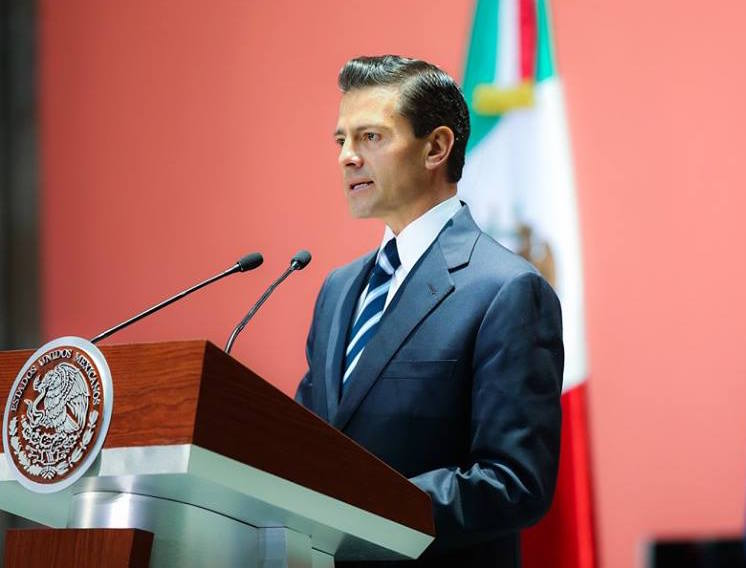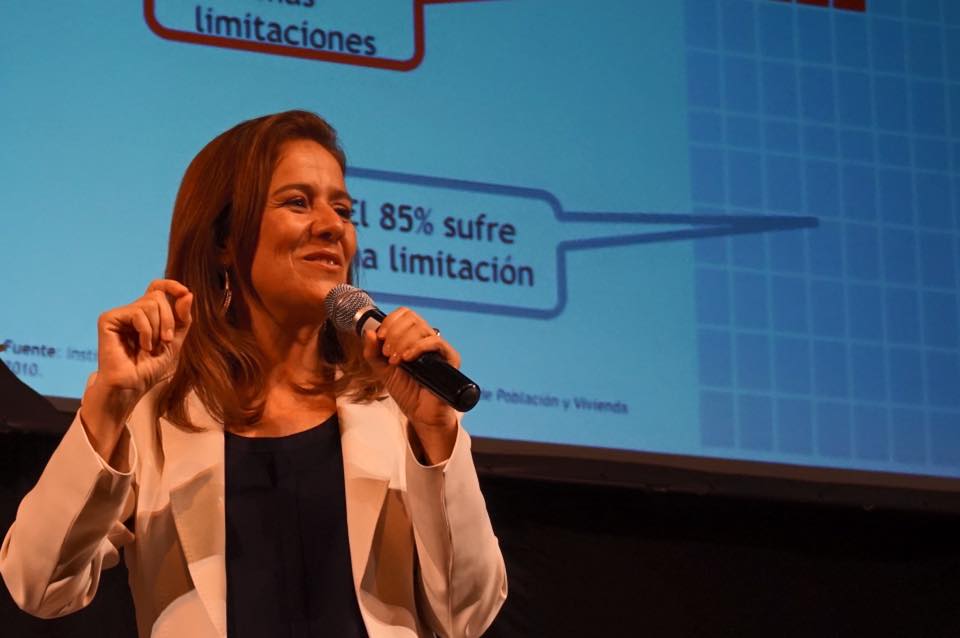
Mexico’s president, Enrique Peña Nieto, was elected in July 2012 to great fanfare, so it was almost certain that his administration would fall well short of expectations.![]()
In the leadup to that 2012 presidential election, Peña Nieto spent so many years as such a heavy frontrunner he was practically Mexico’s president-in-waiting. When he ultimately won the presidency by a margin of around 6.5%, it was less than polls predicted, but still the largest margin of victory in a presidential election since 1994. With movie star looks and a bona-fide star for a wife in Angélica Rivera, a model and telenovela actress, his victory was a triumph not only for himself, but for his party, the Partido Revolucionario Institucional (PRI, Institutional Revolutionary Party), which lost the presidency in 2000 after seven decades of consecutive rule in Mexico and that spent a difficult decade shut out of executive power at the national level. In Peña Nieto, the telegenic former governor of the state of Mexico, with over 15 million people, by far the largest in the country and the surrounding state of Mexico’s central federal district.
* * * * *
RELATED: For El Paso-Juárez,
Trump’s vision of Mexico based on misconception
* * * * *
When he rose to the presidency, Peña Nieto was widely expected to do just two things as the face of what Mexican voters believed to be a reformed and a modernizing PRI.
First, Peña Nieto would enact a range of reforms liberalizing everything from Mexico’s energy sector to its tax collections scheme. Second, Peña Nieto would bring peace to a country roiled by drug violence, lethal competition among drug cartel and what seemed like an increasingly self-defeating militarized response to drug violence by Peña Nieto’s predecessor, Felipe Calderón, of the conservative Partido Acción Nacional (PAN, National Action Party).
On both fronts, Peña Nieto fell short of expectations.
While Mexico might today be more becalmed than in 2012, violence and government incompetence have dominated headlines. Peña Nieto’s presidency will forever be marred by the abduction and assassination of 43 students in Iguala by police officers in Guerrero state in September 2014. The glory of his government’s capture in 2014 of Joaquín ‘El Chapo’ Guzmán, the leader of the infamous Sinaloa cartel, was soon eclipsed by his escape from a maximum-security prison in 2015, and Guzmán, recaptured seven months later, now faces extradition to the United States.
Peña Nieto’s presidency has been a mix of the good (significant political and economic reforms), the bad (corruption, impunity at the highest level of the PRI and his own administration and ineptitude in the face of cartel strength) and the ugly (the Iguala massacre).
By most measures, though, his performance has been far worse than many observers expected, with less impressive reforms than promised and a legacy of sporadic drug violence, police brutalization, personal conflict-of-interest scandals and continuing widespread corruption at all levels of government. That’s all on top of a Mexican economy struggling to deal with far lower global prices for oil and other commodities. It’s so bad that his approval rating sank earlier this month to just 23%, lower than any Mexican president since Ernesto Zedillo faced an acute peso crisis in the mid-1990s.
In the July 2015 midterm elections, the PRI lost nine seats in the Cámara de Diputados (Chamber of Deputies), the lower house of the Mexican congress, and in the June 2016 gubernatorial elections, the PRI lost power in states it’s held since 1929 — including Veracruz, Tamaulipas Durango and Quintana Roo.
Just this week, as he prepares to deliver his state of the union address on Thursday, Peña Nieto has faced down embarrassing revelations that he plagiarized much of the thesis that he submitted for his law degree. Earlier this month, his wife faced fresh accusations of a new conflicts-of-interest scandal involving the use of a luxury apartment from a Mexican businessman in Miami.
So as the Mexican president prepares to welcome Republican presidential nominee Donald Trump for an unexpected private meeting on Wednesday, it’s no understatement that Mexico’s beleaguered president could use a diversion. With his approval ratings so low, though, Trump presents an easy target.
‘Trump goes to Mexico’ is a ‘Nixon goes to China’ move
The stakes for Trump are clear. On the same day that he’s set to deliver a major address clarifying his approach to immigration in Phoenix (after a week of mixed signals over potentially softening his hardline stand), his campaign is gambling that a bilateral visit with Peña Nieto will show that Trump can be presidential and engage with foreign leaders without embarrassing himself, while giving Trump additional credibility as a hard-nosed negotiator for American interests abroad. It’s a risky bet, but the payoffs are clear.
The risks are clear, too.
After all, the businessman rose to the top of Republican polls after launching his presidential campaign by blaming Mexican migrants to the United States for rape and other crimes in the most generalizing terms possible. He has fingered Mexicans as a punching bag, responsible for everything from a growing heroin and opiate drug epidemic in the United States to trade deals like NAFTA that Trump says have weakened US-based manufacturing. At one point, he even suggested that former Florida governor Jeb Bush was soft on immigration policy because he has a Mexican-born wife. He’s stated that a Trump administration would deport up to 11 million Mexican immigrants, some of whom have been living and working in the United States for decades and that he’ll build a wall on the southern US border with Mexico, financed by expropriating remittances that workers in the United States send back to Mexico.
Though the political contours of Trump’s Mexican visit are clear in the United States, the visit could have even more massive consequences in the context of Mexico’s internal politics.
Mexico’s political elite is already pressuring
Peña Nieto to stand up to Trump

Shortly after Trump announced his surprise visit to Mexico City (and after Peña Nieto confirmed it), one of the leading candidates to succeed Peña Nieto — Margarita Zavala, the frontrunner for the PAN’s presidential nomination and Calderón’s wife — tweeted that Trump’s ‘hatred’ would never be welcome in Mexico:
Sr. @realDonaldTrump aunque lo hayan invitado, sepa que no es bienvenido. Los mexicanos tenemos dignidad y repudiamos su discurso de odio.
— Margarita Zavala (@Mzavalagc) August 31, 2016
With the political opposition already egging him on, and with the dignity of all Mexicans on the line, there’s a lot of pressure on Peña Nieto to stand up to Trump and denounce his rhetoric. Vicente Fox, who served as Mexico’s president from 2000 to 2006, has denounced Trump in even harsher language, reiterating on live television at one point that Mexico wouldn’t pay for ‘that fucking wall.’
What better than an opportunity to defend the honor of Mexicans directly to Trump’s face?
Trump might claim tomorrow night in Phoenix (and he has often been dicey with facts in his own reality-challenged campaign) that Peña Nieto groveled to him or offered some sort of apology. If so, he’ll force a strong rebuke from Peña Nieto, a world leader who has already compared Trump’s rhetoric to that of Adolf Hitler and Benito Mussolini.
Mexican presidents are limited to just a single, six-year term. In a sense, that leaves them as lame ducks from the first moments of taking office. In the era of PRI dominance, however, it was an effective mechanism for preventing personality cults and for enforcing party discipline, even over presidents.
But as the Mexican economy continues to stumble, Peña Nieto also has an interest in ensuring that the PRI’s candidate for the 2018 elections can also be competitive. Today, it seems likely that candidate will be Miguel Ángel Osorio Chong, who has served as Peña Nieto’s secretary of the interior since 2012 and, previously, from 2005 to 2011, the governor of Hidalgo, a neighboring state to Peña Nieto’s Mexico state. Though he’s term-limited, there’s a lot at stake for Peña Nieto’s legacy and for the PRI.
Everyone in Mexico is already looking to 2018
Even if Osorio Chong winds up as the PRI’s presidential nominee and if Zavala winds up as the PRD’s presidential nominee, Mexicans might elect a populist of their own in 2018, both somewhat in imitation and in response to the nationalism that’s powered Trump’s rise in American politics.
The most likely such contender is the 2006 and 2012 nominee of the leftist Partido de la Revolución Democrática (PRD, Party of the Democratic Revolution), former Mexico City mayor Andrés Manuel López Obrador. Known throughout Mexico solely by his initials, AMLO after the last election formed another leftist party, the Movimiento Regeneración Nacional (MORENA, the National Regeneration Movement), which gained support in 2015 at the PRD’s expense and which could siphon off even more votes from the PRD in the future. (The PRD is likely to nominate current Mexico City mayor Miguel Ángel Mancera, who has expressed interest in the presidency but polls in single digits for 2018).
Jaime Rodríguez (nicknamed ‘El Bronco’), like Trump a political phenomenon in his own right, emerged from nowhere to win the governorship of Nuevo León in 2015 as the first independent governor in Mexican history. He may attempt his own independent presidential bid in 2018, too.
Though he gets low marks for economic policy, corruption and ongoing violence, Peña Nieto’s record isn’t completely unsuccessful.
As part of the celebrated Pacto por Mexico, an agreement among the PRI, the PAN and (at least initially) the leftist PRD, Peña Nieto enacted several major reforms that eluded both Fox and Calderón.
They include a new electoral reform law that, among other things, now allows reelection for members of the Mexican congress and Mexico’s mayors and that provides an easier path for independent candidates. Even more importantly, an energy reform law opens the state-run oil company Pemex to private investment and partnerships. A telecommunications reform created a new telecom regulator and opens the sector, long dominated by billionaire Carlos Slim’s Telmex, to greater competition.